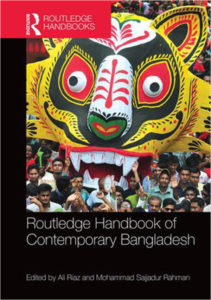
Routledge Handbook of Contemporary Bangladesh
Edited by Ali Riaz, Mohammad Sajjadur Rahman
Routledge (2016)
Rs20,823
In the past decade, Bangladesh has achieved significant social and economic progress. Despite high population density, a limited natural-resource base, underdeveloped infrastructure, frequent natural disasters and political uncertainty, the country has recorded positive developments in terms of broad economic and social indicators. This Handbook presents a comprehensive and interdisciplinary resource on the politics, society and economy of Bangladesh today. Divided into six thematic sections, the Handbook focuses on relevant issues and trends on: History and the making of contemporary Bangladesh; Politics and institutions; Economy and development; Energy and environment; State, society and rights; Security and external relations.
Written by a team of international experts in the field, the chapters provide an accessible and up-to-date insight into contemporary Bangladesh. The Handbook will be of interest to students and academics of South Asian studies, as well as policymakers, journalists and others who wish to learn more about this increasingly important country.
Ali Riaz is Professor and Chair of Department of Politics and Government at Illinois State University, Illinois, USA. Previously, he worked as a Broadcast Journalist at the British Broadcasting Service (BBC) in London. His most recent publications include How Did We Arrive Here? (2015) and Political Islam and Governance in Bangladesh (Routledge, 2010).
Mohammad Sajjadur Rahman is a Research Fellow at Centre for Alternatives, Dhaka, Bangladesh and a PhD student at Clark University, Massachusetts, USA. He has published a number of articles in scholarly journals and contributed chapters in edited volumes.
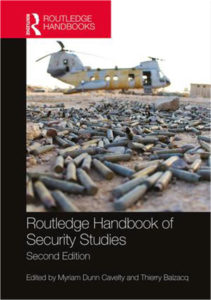
Routledge Handbook of Security Studies
Edited by Myriam Dunn Cavelty, Thierry Balzacq
Routledge (2017)
Rs24,027
This revised and updated second edition features over twenty new chapters and offers a wide-ranging collection of cutting-edge essays from leading scholars in the field of Security Studies.
The field of Security Studies has undergone significant change during the past 20 years, and is now one of the most dynamic sub-disciplines within International Relations. This second edition has been significantly updated to address contemporary and emerging security threats with chapters on organised crime, migration and security, cyber-security, energy security, the Syrian conflict and resilience, amongst many others. Comprising articles by both established and up-and-coming scholars, The Routledge Handbook of Security Studies provides a comprehensive overview of the key contemporary topics of research and debate in the field of Security Studies. The volume is divided into four main parts: Theoretical Approaches to Security; Security Challenges; Regional (In)Security; Security Governance.
This new edition of the Handbook is a benchmark publication with major importance for both current research and the future of the field. It will be essential reading for all scholars and students of Security Studies, War and Conflict Studies, and International Relations.
Myriam Dunn Cavelty is Senior Lecturer and Deputy Head of research and teaching at the Center for Security Studies (CSS), ETH Zurich, Switzerland. She is the author of Cyber-Security and Threat Politics: US Efforts to Secure the Information Age (Routledge, 2008).
Thierry Balzacq is Professor and Tocqueville Chair in International Relations at the University of Namur, Belgium, and Scientific Director at the Institute for Strategic Research at the French Ministry of Defense. His most recent books include Contesting Security (Routledge, 2014), and Traité de Relations Internationales (co-edited with F. Ramel, 2013).
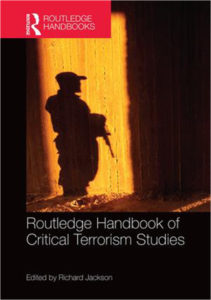
Routledge Handbook of Critical Terrorism Studies
Edited by Richard Jackson
Routledge (2016)
Rs24,027
This new handbook is a comprehensive collection of cutting-edge essays that investigate the contribution of Critical Terrorism Studies to our understanding of contemporary terrorism and counterterrorism.
Terrorism remains one of the most important security and political issues of our time. After 9/11, Critical Terrorism Studies (CTS) emerged as an alternative approach to the mainstream study of terrorism and counterterrorism, one which combined innovative methods with a searching critique of the abuses of the war on terror. This volume explores the unique contribution of CTS to our understanding of contemporary non-state violence and the state’s response to it. It draws together contributions from key thinkers in the field who explore critical questions around the nature and study of terrorism, the causes of terrorism, state terrorism, responses to terrorism, the war on terror, and emerging issues in terrorism research. Covering a wide range of topics including key debates in the field and emerging issues, the Routledge Handbook of Critical Terrorism Studies will set a benchmark for future research on terrorism and the response to it.
This handbook will be of great interest to students of terrorism studies, political violence, critical security studies and IR in general.
Richard Jackson is Professor of Peace Studies and Director of the National Centre for Peace and Conflict Studies, University of Otago, New Zealand. He is the Editor-in-Chief of the journal Critical Studies on Terrorism and author of numerous titles, including most recently Confessions of a Terrorist (2014), Contemporary Debates on Terrorism (co-edited, Routledge 2012) and Terrorism: A Critical Introduction (co-authored, 2011).
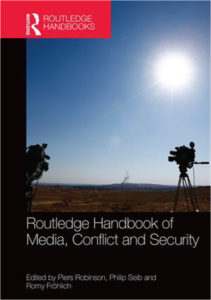
Routledge Handbook of Media, Conflict and Security
Edited by Piers Robinson, Philip Seib, Romy Frohlich
Routledge (2017)
Rs24,027
This Handbook links the growing body of media and conflict research with the field of security studies.
The academic sub-field of media and conflict has developed and expanded greatly over the past two decades. Operating across a diverse range of academic disciplines, academics are studying the impact the media has on governments pursuing war, responses to humanitarian crises and violent political struggles, and the role of the media as a facilitator of, and a threat to, both peace building and conflict prevention. This handbook seeks to consolidate existing knowledge by linking the body of conflict and media studies with work in security studies.
The handbook is arranged into five parts: Theory and Principles; Media, the State and War; Media and Human Security; Media and Policymaking within the Security State; New Issues in Security and Conflict and Future Directions. For scholars of security studies, this handbook will provide a key point of reference for state of the art scholarship concerning the media-security nexus; for scholars of communication and media studies, the handbook will provide a comprehensive mapping of the media-conflict field.
Piers Robinson is Professor of Politics, Society and Political Journalism at the University of Sheffield, UK.
Philip Seib is Professor of Journalism and Public Diplomacy and Professor of International Relations at the University of Southern California, USA.
Romy Fröhlich is Professor of Communication Science and Media Research at Ludwig-Maximilians-University Munich, Germany.
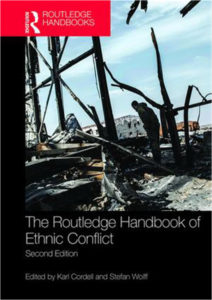
The Routledge Handbook of Ethnic Conflict
Edited by Karl Cordell, Stefan Wolff
Routledge (2016)
Rs20,022
A definitive global survey of the interaction of ethnicity, nationalism and politics, this handbook blends rigorous theoretically grounded analysis with empirically rich illustrations to provide a state-of-the-art overview of the contemporary debates on one of the most pervasive international security challenges today. Fully updated for the second edition, the book includes a new section which offers detailed analyses of contemporary cases of conflict such as in Ukraine, Kosovo, the African Great Lakes region and in the Kurdish areas across the Middle East, thus providing accessible examples that bridge the gap between theory and practice.
The contributors offer a 360-degree perspective on ethnic conflict: from the theoretical foundations of nationalism and ethnicity to the causes and consequences of ethnic conflict, and to the various strategies adopted in response to it. Without privileging any specific explanation of why ethnic conflict happens at a particular place and time or why attempts at preventing or settling it might fail or succeed, The Routledge Handbook of Ethnic Conflict enables readers to gain a better insight into such defining moments in post-Cold War international history as the disintegration of the Soviet Union and Yugoslavia, and their respective consequences, the genocide in Rwanda, and the relative success of conflict settlement efforts in Northern Ireland.
By contributing to understanding the varied and multiple causes of ethnic conflicts and to learning from the successes and failures of their prevention and settlement, the Handbook makes a powerful case that ethnic conflicts are neither unavoidable nor unresolvable, but rather that they require careful analysis and thoughtful and measured responses.
Karl Cordell is Professor of Politics at Plymouth University. He co-edits the journals Ethnopolitics and Civil Wars and has an extensive publication record in the fields of ethnopolitics, German politics and the politics of ethnicity in Central Europe.
Stefan Wolff is Professor of International Security at the University of Birmingham. Frequently advising governments and international organisations, he specialises in the management of international security challenges, especially in relation to conflict settlement and post-conflict state building. Among his publications are more than 20 books and special issues of journals, as well as over eighty journal articles and book chapters. He is co-editor of Ethnopolitics.

